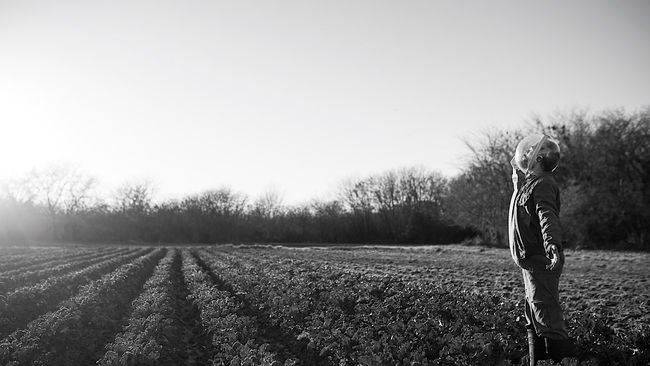Planting lemongrass and blurring lines
05 February 2021
In Thailand, the lemongrass girl is no mythical figure. As soon as thunder rumbles, she is immediately summoned. Her task is as simple as it is fundamental: she collects a bunch of lemongrass, turns it upside down and plants in the soil. Her only prerequisite? Virginity.
After working on a few projects between America and Czech Republic, Thai filmmaker and producer Pom Bunsermvicha eventually turns her gaze towards Thailand with E-po (A Second Chance) (2018), a short film about a Phuket-based old woman with a gambling problem. Fascinated by the intersection between documentary and fiction, Bunsermvicha often explores this liminal space. Her research culminates in Lemongrass Girl (2021), Bunsermvicha’s fifth short film, which plays in the Ammodo Tiger Short Competition at IFFR. Lemongrass Girl – written by Anocha Suwichakornpong and shot on the set of Suwichakornpong’s Come Here (now in post production) – combines a subtle and sophisticated social critique with its playful approach to storytelling.
On a Sunday afternoon, I talked with Bunsermvicha on Zoom and our conversation felt more like a catch-up with an old friend rather than an actual interview. In the time we spent together chatting, we discussed the inspiration behind Lemongrass Girl, Thai indie film community, and Bunsermvicha’s hybrid style.
How did you come up with the concept for Lemongrass Girl?
The idea came to me through conversations. In Thailand this superstition is well known, so we’re pretty used to seeing the lemongrass girl on film sets but no one seems to really think about the implications of her role. So while I was working on Anocha’s film, we extensively talked about this figure and eventually we thought “wouldn't it be fun to make a film about the lemongrass girl while Anocha is shooting her own film?” After that, it was easy to convince everybody to get on board with this other project.
Recently, I’ve watched a few independent Thai short films and noticed that film sets seem to be a recurring setting (Tulapop Saenjaroen’s People on Sunday is one example, but other works by Sorayos Prapapan come to mind too). Do you think there is some sort of common thread that leads to this metacinematic approach?
I think that it just feels natural to us, rather than something we consciously decide on. In my case, it’s a way of paying homage to cinema. The Thai independent film scene is quite a tight-knit community, so everyone really loves working together to make films. It’s almost like a family. So when I started thinking of Lemongrass Girl, my closest experience with the subject was linked to my own life on a film set. Thinking about it, it might be a meta-thing somehow
What interested me while I was watching the film was the nuanced power dynamics that appear on screen. For example, there’s this tremendous pressure that is put on the lemongrass girl, which ultimately also translates into a kind of morbid interest into a woman’s sex life. What are your thoughts on it?
Back in the day people truly believed in this superstition, and they would use it as a litmus test before the wedding. They really thought that a woman had to be pure to marry and the purer you were, the higher your value. In Lemongrass Girl fiction and documentary coexist. You can’t say if it’s a short documentary or a short fiction, right? In the same way, it doesn't matter if Piano is a virgin. The film is a reflection on society and its view of virginity. A huge pressure is put on the woman who performs this task, and eventually it doesn’t even matter if she’s a virgin or not. Either way, it’s a lose-lose situation for the woman. If you're really a virgin, you plant the lemongrass and it doesn't rain, then everyone will make fun of you because you’re a virgin. Instead, if you plant the lemongrass and it rains, you just feel ashamed because everyone will suddenly think that you lied. The pressure is just enormous. And you have to bear with it for as many days as you’re on set. If a film has 25 shooting days, you have to perform the ritual daily and eventually people will be mad at you for not having warded off the rain, because realistically it will rain.
One of the most remarkable aspects of Lemongrass Girl is how it seamlessly combines fiction with documentary. How much of it was actually staged, and how much was just people carrying on with their jobs on set?
Well, it's hard for me to say because if you watch the film, the first half definitely follows linear storytelling. It serves to set up expectations. Piano has to find someone to plant the lemongrass, then she has to do it herself. In the second part, you want to watch the effects of her actions and, I think, this is where the film leans more on documentary. In breaking away from a traditional narrative, the narrative just crumbles and you don’t know what will follow. What’s left is people working on a set. Piano is the film’s Production Manager but on top of that she’s the lemongrass girl too. As such, she had a task to perform and now that she has completed it, she becomes unimportant. Once she does, she is erased from the story.

Ren Scateni
Young Film Critic from United Kingdom at IFFR 2021













